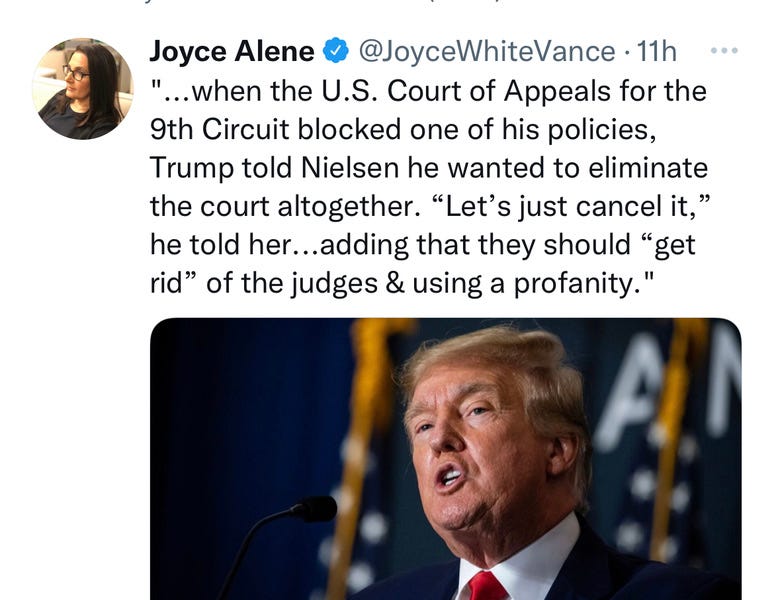Part 3
Judge Cannon rejected it all and refused to grant the stay. This is what set the stage for DOJ to take its request to the 11th Circuit in Atlanta, which is where we are, heading into this week.
While Judge Cannon’s order might be couched in reasonable sounding language, reading it carefully reveals that it’s deeply flawed. It starts with the Judge’s rejection of what common sense alone tells us, that Trump took materials from the White House that are marked classified, and that in the absence of any evidence to the contrary, those markings conclusively establish that they are, in fact, classified.
Judges are supposed to rule based on the evidence in front of them. All the Judge could muster here was that she wasn’t “prepared to adopt hastily” the government’s evidence until a special master could review it. Sure. No problem. Hamper a criminal investigation and shut down a national security risk assessment, because “evenhanded procedure does not demand unquestioning trust in the determinations of the Department of Justice.” There was no rationale for the Judge to reject the uncontroverted evidence in front of her. If anything, her reasoning is emblematic of the damage Trump has done to our democratic institutions, sowing distrust in them to the point that unassailable facts, like the presence of marked, classified documents, could be summarily rejected because, in the Judge’s opinion, DOJ shouldn’t be trusted.
It's not just a terrible ruling in this case, it’s a bad precedent. What person under investigation wouldn’t want to throw this kind of a monkey wrench into DOJ’s work? Apparently, in Judge Cannon’s view at least, that privilege is reserved for former Presidents whose last name is Trump. She suggests her decision is “inherently impacted by the position formerly held by the plaintiff.” So much for the whole, “no man is above the law” tradition established by the Founding Fathers in the Constitution. Judge Cannon said the quiet part out loud, that a former president deserved special consideration. And Judge Cannon’s view didn’t stop Oath Keepers’ leader Stewart Rhodes, currently awaiting trial on charges connected to the insurrection, from asking for a special master of his own. Fortunately, the trial judge is his case smacked down the meritless request.
As a general matter, I don’t criticize judges simply because I disagree with their rulings. Cases are often close calls. The Supreme Court decides a number of cases on a 5-4 vote. Lawyers understand that just because they don’t win, a judge’s decision isn’t necessarily wrong. But Judge Cannon’s decision is wrong in an unprincipled way.
She cuts corners to reach conclusions that benefit the former president. For instance, after DOJ pointed out she’d shut down the entire intelligence community review by prohibiting DOJ from using classified materials in its criminal case, the Judge dismissed the evidence they put in front of her, suggesting that if the criminal and national security investigations were really that intertwined, they should just go ahead.
I had to read it twice, and then again. At the outset of her opinion, she says DOJ can’t even be trusted when they say documents are classified, but now, she’s giving them carte blanch to decide the investigations overlap, in which case they can just ignore her order and proceed with both the criminal case and the intelligence assessment?
DOJ didn’t miss it either. Cannon tried to force DOJ into the untenable position of proceeding with an essential national security assessment while risking her wrath on the backend if she decides their decision was wrong. That could carry damaging consequences for any prosecution DOJ might ultimately bring. Judges shouldn’t play games like this with litigants before them. This is an unworthy ruling in a case that, frankly, should have been referred back to the magistrate judge who signed off on the search warrant at the outset.
Saturday afternoon, the Eleventh Circuit put DOJ’s motion to stay federal district Judge Aileen Cannon’s order on a fast track.

joycevance.substack.com



